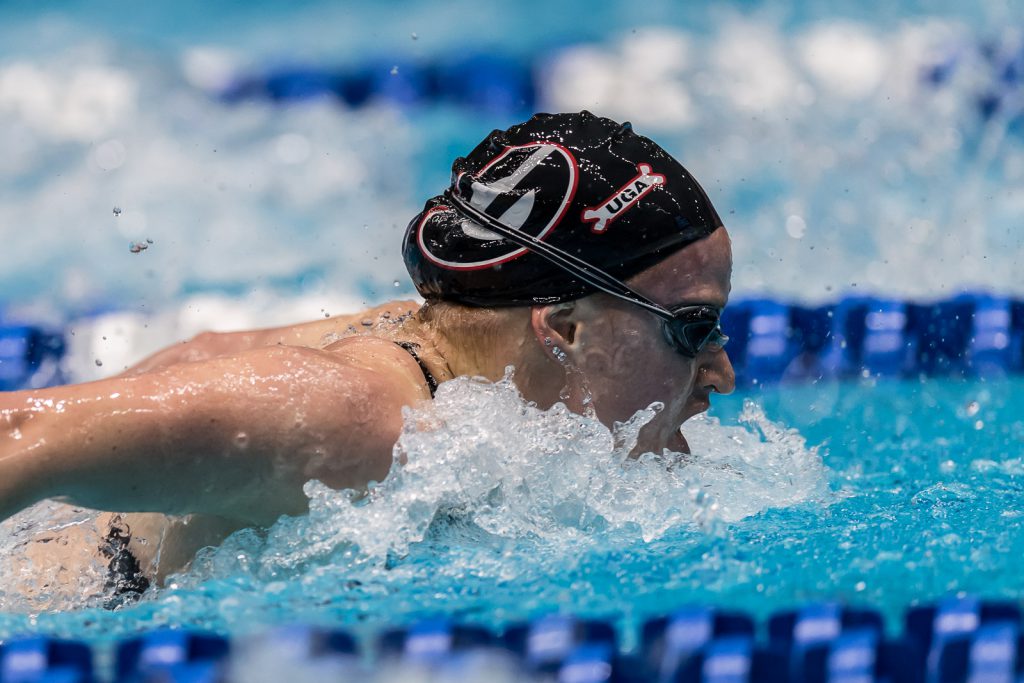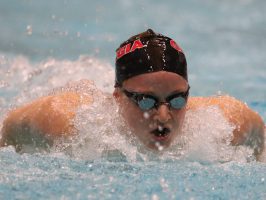With Bad Knees, Megan Kingsley Battles Through NCAA Championships

NCAA DI editorial coverage is proudly sponsored by Adidas. Visit adidasswimming.com for more information on our sponsor. For all the latest coverage, check out our event coverage page.
 CLICK FOR FULL RESULTS
CLICK FOR FULL RESULTS
By David Rieder.
The field was closing in, but Megan Kingsley dug deep. It was the fifth of nine heats of the 200 IM at the women’s NCAA championships, and after establishing a big lead on the fly and back legs, the Georgia junior held on to touch the wall first in 1:56.91.
As soon as she turned around and saw her time, she smashed the water in joy and even disbelief. It was a lifetime best time and one she never saw coming.
“Honestly, it meant absolutely everything because five to six months ago I didn’t think I’d be swimming, let alone making it to SECs, making it to NCAAs. I thought my whole swimming career was over.” – Megan Kingsley
Kingsley had gotten off to a quick start in her third season with the Bulldogs, posting the top time in the country in the 200 fly during Georgia’s season-opening dual meet win against North Carolina. But after winning two events in a meet against Georgia Tech in early November, an old injury resurfaced.
“I was walking around at home—literally walking around. I was hanging up my towel. I kind of turned funny, and my knee subluxed, which means it popped out and then popped back in place. I completely lost all control of my ability to stand, and I fell,” she said.”
This wasn’t the first time Kingsley had dealt with knee issues. It happened in high school, but at the time she simply noticed the sharp pain and swelling. She had gotten through her first two years at Georgia without incident, finishing as high as third in the 200 fly at the NCAA championships as a sophomore, but her clean bill of health was marked up three weeks before Olympic Trials.
While racing the 100 fly final at her final tune-up meet in Austin, Texas, Kingsley dove in and immediately pulled up. Her left knee had dislocated, and that almost derailed her entire hopes of going to Olympic Trials altogether.
Doctors were reluctant to let her keep competing but gave the okay, especially with Trials a once-every-four-years opportunity. She was extremely limited in training—she could not kick or push off with her left foot for more than a week, and it wasn’t until right before the meet when Kingsley even attempted a start.
But she pressed on and flew to Omaha, where she squeezed into the 200 fly semifinal in 16th—not the performance she’d been hoping for one month earlier but admirable under the circumstances.

Photo Courtesy: Cory A. Cole
Suddenly, two months into the college season, it was another knee issue threatening Kingsley’s season, and it was not even the same knee that had dislocated in Austin. This time, it was her right knee. Her future, not only in the sport but in day-to-day life, now seemed in doubt.
“It was like my whole career flashed before my eyes,” she said. “I didn’t know if I’d ever be able to compete again, be able to do a start. Will I be able to walk safely around campus without my knee dislocating?”
On crutches for more than a week, Kingsley slowly made her way back into swimming shape. She swam tethered to the wall or tried to pull, although too much pulling caused her shoulders to flare up. Turns were replaced by spinning around at the wall and pushing off gently with her healthy knee.
Regaining her confidence was a struggle—not behind the blocks confidence but confidence that she could function in daily life. She knew that if the knee flared up again, she was done for the season.
It was not until January that she could attempt full practices or compete in dual meets.
“I made a decision that I would try to swim through it,” she said. “I had to decide if I wanted to redshirt or if I wanted to swim through the season. Everyone knew it would be extremely risky that my knee could dislocate again, and I decided that at that point, my team was the most important thing and I’d made it this far.”
Kingsley made it through the SEC championships and back to NCAAs, where her best time in the 200 IM placed her 20th, and then she finished 21st in the 100 fly.
On the final day of the meet, Kingsley swam the 200 fly, her best event, but after everything she had been through, she wanted to make sure she didn’t put any unreasonable expectations on herself.
“Since I got third last year, it’s kind of hard to go in not having these expectations, but at the same time I need to realize where I’ve come from and say, ‘You didn’t think you were going to be here. You didn’t think you would still be swimming and competing.’ And here I am at one of the most amazing meets in the entire world,” she said.
Kingsley ended up scoring points for the Bulldogs in the 200 fly, finishing 10th in prelims in 1:54.58 and then 12th at night in 1:54.76.

Photo Courtesy: Peter H. Bick
Georgia head coach Jack Bauerle gushed at his junior’s performance and poise in the face of utmost adversity.
“She had a tough, tough injury. She’s dealt with it with aplomb. There’s a lot of fight in that body.” – Jack Bauerle
As for her future, Kingsley isn’t sure what that will hold. On March 28, she will have surgery on her left knee to ensure the subluxation will never happen again. The plan is to have the right knee done three months later.
With a total recovery time of six to eight months, Kingsley does not know whether she will be able to come back and swim her senior season, but she’s hopeful.
“It’s not just a swimming decision—it’s a life decision. It can’t keep happening to me. I don’t want to be 40 and not be able to walk,” she said. “There’s no doubt that I’m super tough, but it’s going to be a daily process, a step-by-step, because six to eight months is a long process.”
What has been toughest for Kingsley to come to grips with is that her athletic career could be ended prematurely because of circumstances outside of her control.
“The thought of life after being an athlete is so hard for everyone,” she said. “You don’t have to be a Division I athlete to lose your identity as a swimmer, an athlete. When it’s taken away from you, you have all this time, and you don’t really know how to identify yourself, and that’s really terrifying.”
But Kingsley plans on doing everything within her power to ensure that doesn’t happen, and she’s ready for what could be a tough process to come.
“I’ve kind of come to the point where I’m ready for it,” she said. “I made it this far, and it’s all I could ask of myself.”




.jpg)

Gives you a real insight into someone’s career besides their stats and makes you think how lucky swimmers like Phelps/Lochte/Natalue Ciughlin et al are/were to gave gone as long as they did and not gave encountered the injuries Megan did.
Good luck in the rest of your career and… I Go ‘Dawgs!
You are so right, Bill. One assumes swimming is a nice, safe, injury free sport but how many flip turns, frog kicks, butterfly strokes can a body take?? The swimmers you mentioned are, indeed, lucky to have such great careers.
Like the perspective and a good story. Thank you for writing this piece.